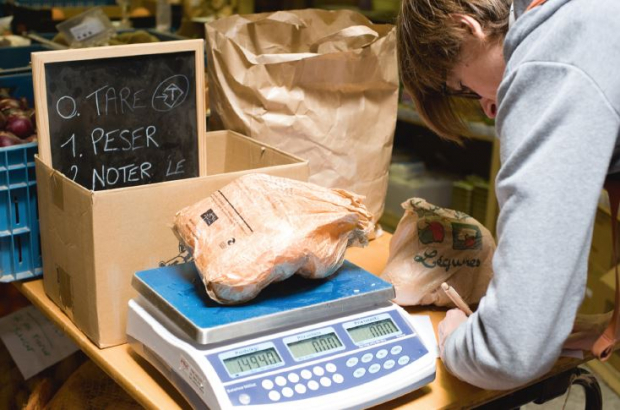- Daily & Weekly newsletters
- Buy & download The Bulletin
- Comment on our articles
Eat smart: The rise of community food projects in Belgium
As shoppers around the world become increasingly aware of the environmental impact of what they buy, alternative shops are cropping up to cater to the socially conscious market. One of them is Brussels’ own cooperative supermarket, Bees Coop, set to open at the beginning of 2018.
Modelled on similar projects in Brooklyn and Paris, Bees Coop’s converted garage in Schaerbeek is filled with groceries that are sustainable and sourced locally where possible, with minimal packaging and with a fair price for the producers. It’s non-profit, and in exchange for the opportunity to shop in such an environment, customers buy shares in the business.
“The goal for us was to be able to shop where we are in accordance with the values of the products,” says Quentin Crespel, one of the founders. “We also try to buy at a price that’s good for us and good for the producers. And our margin is quite low. It’s only to cover the costs, so you are not paying huge amounts to a director.”
The Bees Coop model is quite simple. Aspiring members are encouraged to buy four shares priced at €25 each. They must also work for three hours a month in the shop after it has its grand opening in January, and are invited to join the annual general meeting and get involved in the decision-making process. Already the cooperative has about 1,400 members. In January, it will move to new larger premises next door, though it is already open for business during its test phase.
Kate Meier, a Canadian living in Schaerbeek, asked to be a shareholder after experiencing coops in her home country. “Basically, a big thing for me is packaging. I hate over-packaging,” she says. “Another motivating factor is that I know farmers and I see how the supermarket model affects them. If you know farmers, you can see that a very cheap pint of milk has a big impact on them. And I don’t want my milk from factories with hundreds of cows.”
With many ecological projects, there are question marks about their affordability for the masses. While environmental campaigners laud the benefits of green technologies and eventual returns on investment, some people’s budgets are just too tight to fund the required initial outlay. The discount brands available at large supermarkets are hard to beat financially.
“We’re not playing the same game as the big supermarkets whose products come from huge farms,” says Crespel. “We won’t be able to have the same price. But you can buy one share, and with one share you are a member like everyone else. You won’t find lots of marketing and incentivised products,” he adds, pointing out that supermarket multi-buy offers lead people to buy lots of products they don’t need.
As a customer and a mother of two, Meier is enthusiastic about the future. “The more people who shop there, the cheaper it will get,” she says. “Of course, if food is mass produced, then it’s going to be cheaper. But if you shop at bio shops already, you are probably not going to pay more. Over time, it will become more accessible with good quality food from viable sources."
For the future of Bees Coop, Crespel and his colleagues are thinking big but still local. “We want to succeed with this shop and keep the family, neighbourhood atmosphere. We also want to help people open new shops.”
You might also like…
Growfunding capitalises on the rise of crowdfunding to support projects with a social impact, by exchanging services that help organisers get projects off the ground. Among projects it has supported are the insect cereal bar Kriket, neighbourhood welcome project Dine with Us, and sustainable supermarket Lokale. Socrowd, which co-finances sustainable initiatives, shares its vision.
Le MagaSain, an organic delicatessen in Ixelles, has been welcoming customers for more than 30 years. It serves a wide range of organic products, including fresh bread, fruit and veg, vegan produce, natural cosmetics and essential oils.
Bio Shop is a chain of independent organic stores across Flanders with one outlet in Brussels, Den Teepot, and one in Eupen in Liège province.
La Ruche Qui dit Oui! is a network connecting customers in various communes with local farms and producers. By directly supporting neighbourhood agriculture, it offers a sustainable economy.
Färm is a cooperative supply network, again linking customers to producers. More than 5,000 organic products are available via shops in central Brussels, Woluwe-Saint-Lambert, Auderghem, Uccle, Ixelles and Louvain-la-Neuve.
eFarmz is a farm-to-table food movement, which works with a network of pioneering producers. Customers place orders and their produce is cultivated or prepared to guarantee unbeatable freshness. It includes organic baskets, fruit and vegetables, dairy produce, delicatessen, drinks, meat and fish. Orders are delivered for free to a pick-up point or delivered for a minimal charge. See also Cirkle.
Le Marché Bio in the Marolles district of Brussels is an organic market selling fresh produce, bread, eggs, dried goods and condiments and Italian specialities. The Barn in Etterbeek works closely with local producers to offer seasonal, organic fruit, veg, bread and drinks.
This article first appeared in The Bulletin autumn 2017. Browse the magazine here, pick up a copy in newsagents or subscribe today...









